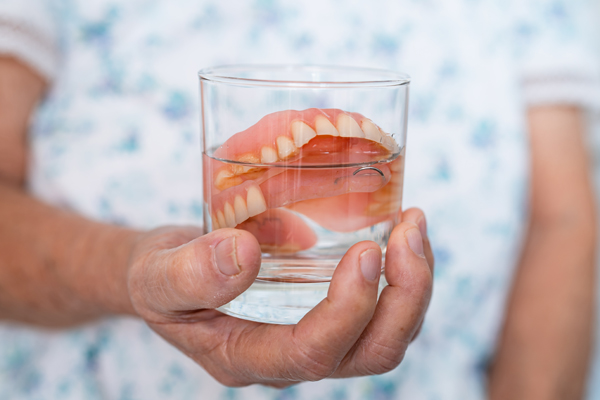Adjusting to New Dentures: When You Should Replace Your Old Dentures

Adjusting to new dentures is a familiar feeling to the 36 million Americans that have no teeth, according to the American Dental Association (ADA). Dentures allow those Americans to eat and speak normally when they have lost their natural teeth to age, gum disease, or dental trauma. Unfortunately, even the best dentures are expected to last only 7-10 years. If you are unsure whether it is time to replace your dentures, keep these signs in mind.
Changes in fit
Commonly, dentures stay in place through implants, a close fit to the gums and jaw bone or, for partials, a clasp that fits onto a natural tooth. All of these are custom-made to match your mouth's anatomical structure. However, when teeth are missing, this structure is not always constant. Other teeth settle into a new position, gums shift or recede, and jawbones shrink as they are resorbed. Consistently wearing your dentures helps fix teeth and gums in place, and exercising your jaw can prevent bone resorption. However, some changes are still to be expected over the years. Left unaddressed, loose dentures not only cause discomfort and difficulty in talking and eating; they may also irritate gum tissue or trap food and plaque, leading to sores and lesions that further worsen the issue.
Often, it is apparent when dentures are loose because they shift or even fall out. You can also tell that you may have a fit issue if they make a clicking sound when you eat or speak, or if you have a hard time speaking clearly. Your dentist may also detect changes in your mouth's structure during regular visits by taking impressions and comparing them to previous ones.
Relining dentures
For relatively new dentures, a complete replacement may not be necessary if they stop fitting properly. Instead, if the changes are minor, a dentist can reline your dentures in the office. The process consists of adding or replacing the base material where it comes into contact with the gums. Relining saves you the cost of full replacement and the period of adjusting to new dentures. You can talk to your dentist about this option during your regular visits.
Damage and wear
Taking good care of your dentures extends their lifespan and keeps them fitting properly. Still, accidents can occur and regular use does wear on the materials. Besides teeth chipping or breaking off, signs of damage to your dentures include:
- Deterioration of materials
- Stained or discolored teeth, typically caused by the formation of cracks
- Visibly bent or warped base
- Irritated gums or tongue
- Pain and discomfort while chewing or speaking
- Unexplained pain or discomfort in the jaw or neck
Attempting to fix damaged dentures on your own is not recommended, especially fixing the base, as this is likely to worsen the issue.
Damage can be mitigated through proper care: regular brushing and cleaning with cold water and approved cleaning solutions. Do not use abrasive materials or products containing bleach or peroxide. Also, avoid chewing or biting down on very hard foods.
Conclusion
While adjusting to new dentures is rarely enjoyable, your old ones eventually need to be replaced. Be aware of signs of damage or changes in fit to know when it is time to invest in a new set.
Request an appointment here: https://www.mouthdocs.com or call Piper Family Dentistry at (727) 564-9677 for an appointment in our Largo office.
Check out what others are saying about our dental services on Google: Adjusting to New Dentures in Largo, FL.
Related Posts
A full mouth reconstruction rebuilds the bite, teeth, and gum health to restore comfortable function and appearance. Patients consider full mouth reconstruction when multiple teeth suffer from decay, fractures, wear, or loss. The process combines restorative and cosmetic dentistry to improve chewing, speech, and jaw balance. Because the mouth works as a system, addressing several…
A dental crown is a common restoration that provides essential protection and structural support for damaged or weakened teeth. Over time, even the most durable dental crown can experience wear, misalignment, or develop issues that compromise your oral function and health. Here are five signs that indicate it is time to replace or refit a…
Invisalign® treatment can be used to gradually align your teeth through plastic trays that are replaced approximately every two weeks. In this article, we'll take an in-depth look at how this popular treatment works and why it's one of the most effective ways to achieve straight teeth.No longer are you stuck with braces as the…
Whether you are about to book an appointment for tooth implants or you have just undergone the procedure, you probably want to learn proper aftercare to ensure healing and recovery. One of the questions that patients often ask is what and what not to eat after surgery. Although placing implants ensures that you have dental…






